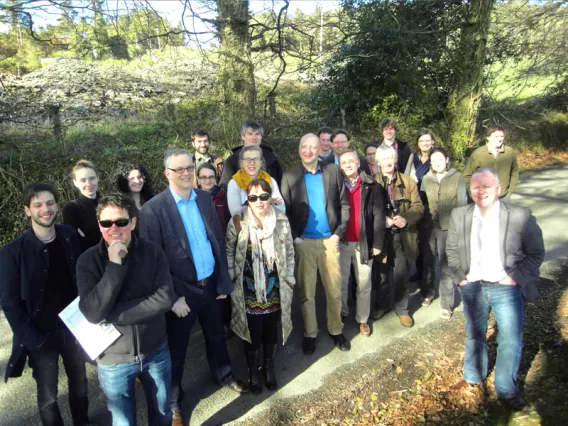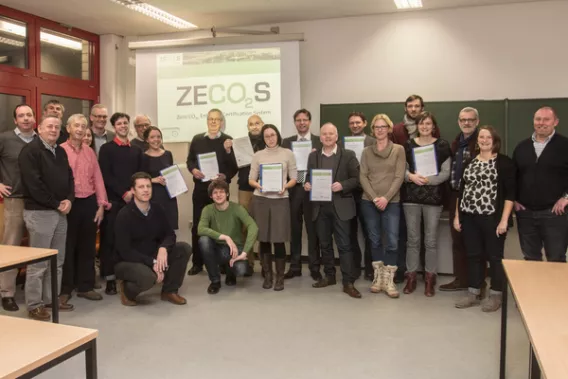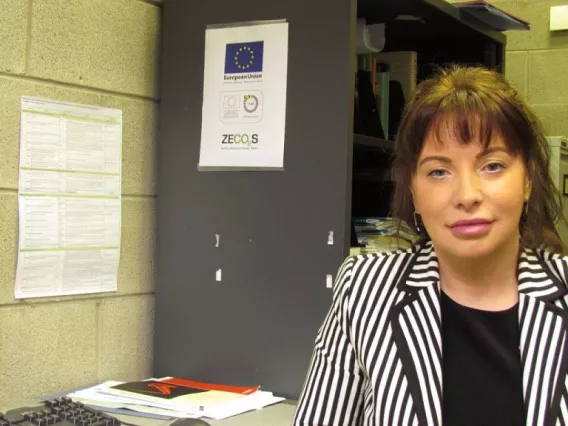Project
This project was designed to create a set of community resources to help encourage and facilitate communities to take actions to continually reduce their greenhouse gas emissions; and to provide a clear management standard for such activities, so as to ensure that claims made in relation to greenhouse gas emission reductions are comparable, justified and verifiable. Both objectives were fully met, and several communities were able to achieve the required standard. The next phase will see the roll-out of the ZECOS standard across EU states.
It aimed to quantify financial savings and greenhouse gas emission reductions resulting from communities’ active participation in sustainable development, especially in relation to energy production and consumption, and to create an EU-wide standard and creditation system for communities engaged in greenhouse gas emission reduction.
Ballynagran Zero Carbon community in Co Wicklow; Institute for Applied Material Flow Management (IfaS), Germany; TÜV Rheinland Energy and Environment GmbH, Germany; Energy Agency for the Region of Trier, Germany; MosArt, Ireland; Odisse, Belgium; European Academy of Renewable Energy, UK
UL worked closely with Ballanagran Zero Carbon community in Co Wicklow, which was an exemplar of what can be achieved in a dispersed rural community. With UL aid, the community undertook and material flow analysis, identified potentials in energy production and reduction, assessed potentials in terms of financial feasibility, gains to the community and greenhouse gas emission reduction, and made investments (made possible by identifying funding sources) in reducing consumption through improved insulation.The community has made good progress and is in the process of building a wind turbine.
Research
ZECOS (Zero CO2e Emission Certification System) is an EU project involving a group of academic, public and private partners working together to create a model for a certification system. The system is designed to assist communities in reducing greenhouse gas (GHG) emissions and towards the ultimate goal of zero emissions. It aims to quantify financial savings and greenhouse gas emission reductions resulting from communities’ active participation in sustainable development, especially in relation to energy production and consumption, and to create an EU-wide standard and accreditation system for communities engaged in greenhouse gas emission reduction.
The use of more locally produced energy reduces dependence on imports, boosts economic growth, and creates jobs. For the EU to meet its commitments on GHG emission reduction and to reach the goal of transforming Europe into a low carbon competitive economy, it is vital that all communities should plan for GHG emission reductions. Communities are where people live and work, they own or manage the resources, land and built environment where significant progress can be made. Communities can face many barriers and a system that encourages community level actions is necessary. ZECOS aims to break down these barriers through providing guidance and information on technology and management options, on financing, and to encourage citizen involvement and improving social and economic development within communities. From experience gained in developing the system, the project partners advised policy making at local, national and EU levels to support communities in reducing GHG emissions.
Certification and Accreditation Methodology and Operational system for Communities wishing to achieve Zero Emissions by improving sustainability. Policy recommendations at EU, national and regional/local level which help to further encourage communities seeking to take action. Research Reports, Website, Handbook for Communities, Green Finance Manual for communities, as well as a Material Flow Analysis (MFA), Masterplan and CO2 balance for each project community, PhD Thesis.
Resources


